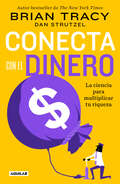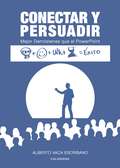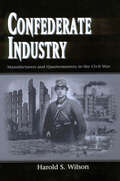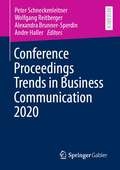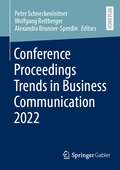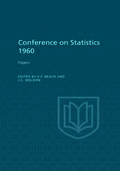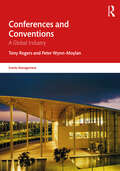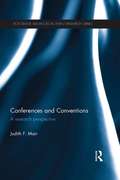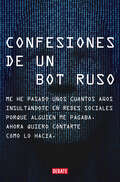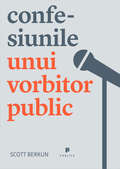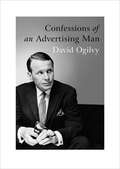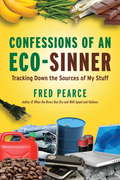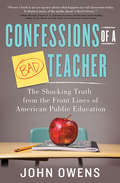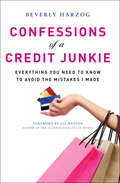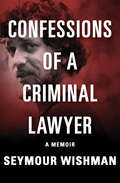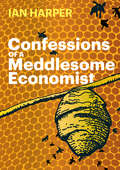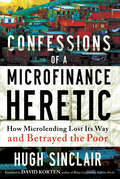- Table View
- List View
Conducting a Risk Strategy Audit: Managing Learnable Risks
by David ApgarOne of the primary myths about risk is that there's no pattern to how risks evolve. The author argues, however, that nonrandom, or learnable risks, have natural life cycles, which has a big impact on how we should select risky projects and activities. This chapter reveals where your major risks are in their life cycles. The result is a picture of your risk pipeline that highlights where you have taken on too many risks that require intensive learning and where you may be developing too few risk skills to stay competitive. The risk strategy audits provide a practical way to implement one of the rules of risk intelligence: Sequence risky projects in a "learning pipeline." This chapter is excerpted from "Risk Intelligence: Learning to Manage What We Don't Know."
Conducting a Telephone Interview
by Vaibhav GuptaThis book is designed for managers and HR professionals who have to conduct telephone interviews and wish to improve their technique in order to get the most out of the recruitment process.
Cone of Shame
by Winnie AuThe hard plastic post-surgery cone is every dog&’s worst nightmare. But in this stunning collection by celebrated photographer Winnie Au and designer Marie-Yan Morvan, it becomes an iconic statement of personality and visual wit. Each dog featured in this book models a bespoke cone made from unique materials—everything from eggshells to repurposed pool noodles to luxe suede and silk flowers. These works of art are designed to amplify the one-of-a-kind charm and self-possessed dignity that makes every dog special and charming in their own way. As hilarious as it is beautiful, Cone of Shame is a showcase of the unmatched power of dogs to inspire joy, devotion, and unconditional love.
Conecta con el dinero: La ciencia para multiplicar tu riqueza
by Brian TracyLa ciencia para multiplicar tu riqueza El dinero es uno de los temas más fascinantes, atractivos, polémicos y mejor investigados del mundo. Se han escrito cientos de libros sobre qué es, cómo ganarlo, cómo gastarlo, quién lo tiene y por qué. Sin embargo, a pesar del enfoque y el interés constantes en la materia, hay una palabra que describe la opinión de la persona promedio sobre el dinero: confusión. En este libro, Brian Tracy, autor bestseller de The New York Times, enseña las leyes del dinero y cómo obtenerlo desde la perspectiva del método científico. Estas leyes han sido probadas una y otra vez no sólo por algunos años, sino durante siglos por miles de personas y siempre han dado el mismo resultado: prosperidad. Si simplemente estudias las ideas de este libro y las aplicas a tu vida y a tus negocios, en poco tiempo podrás ver los efectos del éxito financiero.
Conectar y Persuadir: Mejor Demóstenes que el PowerPoint
by Alberto Vaca EscribanoMejor Demóstenes que el PowerPoint. Los discursos de los directivos tienen cierta similitud con el cuento El traje nuevo del emperador. <P><P>Si los escuchamos sin el halo que los envuelve su autoridad, la mayoría serían incoloros, inodoros e insípidos. <P><P>Pero... ¿quién se atreve a decirles a esos hombres poderosos que en realidad están desnudos? Igual, las nuevas generaciones por fin lo hacen.
Confederate Industry: Manufacturers and Quartermasters in the Civil War
by Harold S. WilsonBy 1860 the South ranked high among the developed countries of the world in per capita income and life expectancy and in the number of railroad miles, telegraph lines, and institutions of higher learning. Only the major European powers and the North had more cotton and woolen spindles. This book examines the Confederate military's program to govern this prosperous industrial base by a quartermaster system. By commandeering more than half the South's produced goods for the military, the quartermaster general, in a drift toward socialism, appropriated hundreds of mills and controlled the flow of southern factory commodities. The most controversial of the quartermasters general was Colonel Abraham Charles Myers. His iron hand set the controls of southern manufacturing throughout the war. His capable successor, Brigadier General Alexander R. Lawton, conducted the first census of Confederate resources, established the plan of production and distribution, and organized the Bureau of Foreign Supplies in a strategy for importing parts, machinery, goods, and military uniforms. While the Confederacy mobilized its mills for military purposes, the Union systematically planned their destruction. The Union blockade ended the effectiveness of importing goods, and under the Union army's General Order 100 Confederate industry was crushed. The great antebellum manufacturing boom was over. Scarcity and impoverishment in the postbellum South brought manufacturers to the forefront of southern political and ideological leadership. Allied for the cause of southern development were former Confederate generals, newspaper editors, educators, and President Andrew Johnson himself, an investor in a southern cotton mill. Against this postwar mania to rebuild, this book tests old assumptions about southern industrial re-emergence. It discloses, even before the beginnings of Radical Reconstruction, that plans for a New South with an urban, industrialized society had been established on the old foundations and on an ideology asserting that only science, technology, and engineering could restore the region. Within this philosophical mold, Henry Grady, one of the New South's great reformers, led the way for southern manufacturing. By the beginning of the First World War half the nation's spindles lay within the former Confederacy, home of a new boom in manufacturing and the land of America's staple crop, cotton.
Confederated Pulp & Paper
by David E. BellA rewritten version of an old case that updates the dates and prices and simplifies the economics. The issue is still one of determining a suitable inventory of wood for the mill to last through the winter.
Conference Proceedings Trends in Business Communication 2020
by Peter Schneckenleitner Wolfgang Reitberger Alexandra Brunner-Sperdin Andre HallerThe conference proceedings Trends in Business Communication 2020 presented here show a small selection of the wide range of current research topics in the field of marketing and communication. The spectrum of topics ranges from leadership communication, communication in agile organisations and tweeting CEOs to new developments in e-learning and current requirements for online shareholder meetings to sustainable consumer behaviour, communication in times of home office and new aspects of social media topics. All contributions were presented orally at the international online conference "Trends in Business Communication" on 4 December 2020, the full papers were subjected to a peer review process.
Conference Proceedings Trends in Business Communication 2022
by Peter Schneckenleitner Wolfgang Reitberger Alexandra Brunner-SperdinThe academic conference Trends in Business Communication (TIBCOM) addresses current and upcoming trends in the communication sector. International scientists present their new findings in the fields of marketing and communication after a peer-review process. The presented content will be mapped and submitted in form of Full Scientific Papers and will be the subject of this conference proceedings. The international conference took place virtually on December 9, 2022.
Conference Proceedings Trends in Business Communication 2024
by Peter Schneckenleitner Wolfgang Reitberger Alexandra Brunner-SperdinThe 10th edition of the international academic conference Trends in Business Communication (TIBCOM) once again presents the latest research findings in marketing and communication. This proceedings volume gives the reader a compact overview of the key findings. All published scientific papers have undergone a detailed review process. The TIBCOM Conference 2024 focused on topics like Artificial Intelligence, Employer Branding, Femvertising or the effects of visual distractors in webshops.
Conference on Statistics 1960
by J. C. Weldon E. F. BeachIn 1958 the Canadian Political Science Association established a committee to look into ways and means of improving statistical research in the social sciences in Canada. One of the ways in which the committee thought this could be done was by establishing an annual forum where papers could be presented and discussed. Eight papers given at the first Conference at Queen's University are contained in this volume. Diverse alike in subject and statistical method---as indeed a collection of papers reflecting the purpose of the founding committee is bound to be---the papers as printed incorporate the discussion that attended their presentation in 1960.The papers are: K.A.H. Buckley, "Historical Estimates of Internal Migration in Canada,"; Richard E. Du Wurs, Robert Batson, Margaret Daffron, "The 'Mass Society' and 'Community' Analyses of the Social Present"; P.J. Giffen, "Canadian Criminal Statistics"; E.J. Hanson, "The Post-war Rise of the Crude Petroleum Industry"; Gideon Rosenbluth, "Salaries of Engineers and Scientists, 1951"; David N. Solomon, Agnes M. Fergusson, "The Distribution and Functions of Canadian Engineers and Scientists"; K.W. Studnicki-Gizbert, "The Structure and Growth of the Canadian Air Transport Industry"; T.R. Vout, "The Canadian Manufacturing Industry, 1900-57."
Conferences and Conventions 3rd edition: A Global Industry (Events Management)
by Tony RogersConferences and Conventions: A Global Industry 3rd edition provides a comprehensive introduction to the key elements of the global conference, convention and meetings industry. It examines the industry’s origins, structure, economic, social and environmental impacts, education, training and career opportunities, and the industry's future development. It also explores its links with the wider tourism industry, and suggests that there should be a realignment of these links, putting a greater focus on designing, executing and measuring meeting and convention contents so that they have a purposeful impact on participants, thus creating greater value for stakeholders. It suggests that there should be greater emphasis on the role that meetings play in economic, professional and educational development, promoting the benefits they provide in knowledge exchange, scientific research, technology transfer, networking and motivation and showing clearly what such business events actually accomplish. This revised 3rd edition has been updated to reflect current trends and emerging topics and achieve a more international approach. This edition has also been updated with the following features: New content on social media, web based marketing, the use of technology, experiential marketing and events, the role of trade shows in conventions,?issues of sustainability, and moves to create a profession for event management. Fully integrated and updated case studies to highlight current issues and demonstrate theory in practice. Also contains new case studies on the growth markets of Asia, Brazil and the Middle East. A detailed meetings and events industry lexicon. This book is written in an accessible and engaging style and structured logically with useful features throughout to aid students’ learning and understanding. This book is an invaluable resource to students following Events Management, Hospitality and Tourism courses. ?
Conferences and Conventions: A Global Industry (Events Management)
by Tony Rogers Peter Wynn-MoylanFully revised and updated to reflect current trends and emerging topics, the fourth edition of Conferences and Conventions: A Global Industry provides an expert-led, comprehensive introduction to, and overview of, the key elements of the global conference, convention and meetings industry. This book examines the conference industry’s origins, structure and future development, as well as its economic, social and environmental impacts. It provides an in-depth analysis of the strategies, practices, knowledge and skills required to organise memorable conferences and similar business events, with detailed descriptions of all the planning and operational processes. Following an international approach, this edition features additional sections on the increase in technological advancements and opportunities, as well as the rise of virtual and hybrid events in a post-pandemic era. Written in an accessible and engaging style, the book includes integrated case studies to highlight current issues and demonstrate theory in practice. Structured logically with useful features throughout to aid learning and understanding, this book is an invaluable resource to students following events management, hospitality and tourism courses, as well as for event planners and practitioners already working in the conference industry.
Conferences and Conventions: A Research Perspective (Routledge Advances in Event Research Series)
by Judith MairConferences and conventions are one of the fastest growing areas of the events industry. This is a substantially important sector yet research into many dimensions is in its infancy. This timely book, uniquely presents a ‘state of the art’ synthesis of the research on both demand and supply sides of the industry as well as insights into how current and future trends are affecting conferences and conventions. This volume provides a critical review of the players involved in conferences and conventions; destination image and impacts; and current and future trends. The players in the industry include attendees/delegates, professional conference organisers, and association meeting planners. On the destination side, conference venues and facilities, along with convention and visitor bureaux are examined, as well as how destination image can be developed and improved. Further, this section considers the economic, social and environmental impacts of conferences and conventions. The final section considers some of the major trends that are likely to impact on the industry, including climate change, new technologies and risk and crisis management. To reflect the sector’s international nature case studies and examples from different geographical regions are included throughout. By identifying gaps in our knowledge, and presenting a collection of themes to guide future research, this book not only adds to our current knowledge, but will underpin the advancement of knowledge in the future. This book is essential reading for all those interested in Events.
Confesiones de un bot ruso: Me he pasado bastantes años insultándote en redes sociales porque alguien me pagaba. Ahora que ya no estoy en nómina, quiero contarte cómo lo hacía.
by Bot RusoLOS SECRETOS QUE PARTIDOS POLÍTICOS, MULTINACIONALES Y ORGANIZACIONES MUNDIALES NO QUIEREN QUE CONOZCAMOS CONTADOS DESDE DENTRO. ME HE PASADO BASTANTE AÑOS INSULTÁNDOTE EN REDES SOCIALES PORQUE ALGUIEN ME PAGABA. AHORA QUE YA NO ESTOY EN NÓMINA, QUIERO CONTARTE CÓMO LO HACÍA. Bot Ruso pasó los últimos años de su trayectoria profesional al servicio de una agencia dedicada al astroturfing, con un equipo de trols a su cargo y operando en distintas misiones cuyo objetivo era manipular la conversación en la red. Ahora que ya no trabaja allí, se ha decidido a contar detalles sobre cómo se preparan y funcionan hoy las célebres campañas de bots y trols para empresas, partidos políticos o clubes deportivos. Con un enfoque divertido, irónico y muy didáctico, este libro nos abre los ojos y nos da las herramientas para reconocer este tipo de prácticas, evitar caer en la red de bulos y desenmascarar el modus operandi de los que mueven este negocio oscuro y poco ético.
Confesiunile unui vorbitor public
by Scott BerkunÎn acest volum plin de haz ?i extrem de practic, scriitorul ?i vorbitorul profesionist Scott Berkun ne dezv?luie tehnicile folosite de marii oratori ?i ne arat? cum le poate utiliza oricine pentru a comunica mai bine.
Confessions Of An Advertising Man
by David Ogilvy Alan Parker<P>A new edition of the timeless business classic featured on Mad Men as fresh and relevant now as the day it was written <P>"We admire people who work hard, who are objective and thorough. We detest office politicians, toadies, bullies, and pompous asses. We abhor ruthlessness. The way up our ladder is open to everybody. In promoting people to top jobs, we are influenced as much by their character as anything else."-David Ogilvy <P>David Ogilvy was considered the "father of advertising" and a creative genius by many of the biggest global brands. First published in 1963, this seminal book revolutionized the world of advertising and became a bible for the 1960s ad generation. It also became an international bestseller, translated into 14 languages. <P>Fizzing with Ogilvy's pioneering ideas and inspirational philosophy, it covers not only advertising, but also people management, corporate ethics, and office politics, and forms an essential blueprint for good practice in business."
Confessions of A Steam-Age Ferroequinologist: Journeys on BR’s London Midland Region
by Keith Widdowsonferroequinologist (noun) Someone who studies the ‘Iron Horse’ (i.e. trains and locomotives). From the Latin ferrus ‘iron’ and equine ‘horse’ + -logist As the British steam era drew to a close, a young Keith Widdowson set out to travel on as many steam-hauled trains as possible – documenting each journey in his notebooks. In Confessions of a Steam Age Ferroequinologist, he cracks these books open and blows off the dust. His self-imposed mission, that of riding behind as many Iron Horses as possible prior to their premature annihilation, led to hours of nocturnal travels, extended periods of inactivity in station waiting rooms, missed connections and fatigue. However, any downsides of his quest were compensated by the camaraderie found amongst a group of like-minded colleagues who congregated on such trains. This is a book that no self-respecting ferroequinologist should be without.
Confessions of An Eco-Sinner: Tracking Down the Sources of My Stuff
by Fred PearceA 2008 Indie Next Pick In Confessions of an Eco-Sinner, Fred Pearce surveys his home and then sets out to track down the people behind the production and distribution of everything in his daily life, from his socks to his computer to the food in his fridge. It’s a fascinating portrait, by turns sobering and hopeful, of the effects the world’s more than six billion inhabitants have on our planet-and of the working and living conditions of the people who produce most of these goods.
Confessions of a Bad Teacher: The Shocking Truth from the Front Lines of American Public Education
by John OwensAn explosive new look at the pressures on today's teachers and the pitfalls of school reform, Confessions of a Bad Teacher presents a passionate appeal to save public schools, before it's too late. When John Owens left a lucrative job to teach English at a public school in New York City's South Bronx, he thought he could do some good. Faced with a flood of struggling students, Owens devised ingenious ways to engage every last one. But as his students began to thrive under his tutelage, Owens found himself increasingly mired in a broken educational system, driven by broken statistics, finances, and administrations undermining their own support system-the teachers. The situation has gotten to the point where the phrase "Bad Teacher" is almost interchangeable with "Teacher." And Owens found himself labeled just that when the methods he saw inspiring his students didn't meet the reform mandates. With firsthand accounts from teachers across the country and tips for improving public schools, Confessions of a Bad Teacher is an eye-opening call-to-action to embrace our best educators and create real reform for our children's futures.
Confessions of a Bookseller
by Shaun BythellA funny memoir of a year in the life of a Scottish used bookseller as he stays afloat while managing staff, customers, and life in the village of Wigtown.Inside a Georgian townhouse on the Wigtown highroad, jammed with more than 100,000 books and a portly cat named Captain, Shaun Bythell manages the daily ups and downs of running Scotland’s largest used bookshop with a sharp eye and even sharper wit. His account of one year behind the counter is something no book lover should miss.Shaun drives to distant houses to buy private libraries, meditates on the nature of independent bookstores (“There really does seem to be a serendipity about bookshops, not just with finding books you never knew existed, or that you’ve been searching for, but with people too.”), and, of course, finds books for himself because he’s a reader, too.The next best thing to visiting your favorite bookstore (shop cat not included), Confessions of a Bookseller is a warm and welcome memoir of a life in books. It’s for any reader looking for the kind of friend you meet in a bookstore.Praise for Shaun Bythell and Confessions of a Bookseller“Something of Bythell’s curmudgeonly charm may be glimpsed in the slogan he scribbles on his shop’s blackboard: “Avoid social interaction: always carry a book.” —The Washington Post“Bythell’s wicked pen and keen eye for the absurd recall what comic Ricky Gervais might say if he ran a bookshop.” —The Wall Street Journal“Irascibly droll and sometimes elegiac, this is an engaging account of bookstore life from the vanishing front lines of the brick-and-mortar retail industry. Bighearted, sobering, and humane.” —Kirkus Reviews“Amusing and often cantankerous stories [that] bibliophiles will delight in, and occasionally wince at.” —Publishers Weekly
Confessions of a Credit Junkie
by Liz Weston Beverly Harzog"Beverly Harzog is a credit warrior. She has gone into the arena, faced the lions, and emerged as one of the foremost experts in the field. I believe that her encyclopedic knowledge of the world of credit cards is unmatched." --Adam Levin, Chairman and Cofounder of Credit.com Credit card expert Beverly Harzog shares how she went from being a credit card disaster to a credit card diva. After graduating from college, Beverly spent the next ten years racking up debt on seven credit cards. Credit card limits, she believed, were merely "guidelines," certainly not anything to be taken seriously . . . especially if she was in dire need of a new pair of shoes. The fact that she was a CPA at the time adds an ironic twist to the credit quagmire she slowly descended into. In Confessions of a Credit Junkie, Beverly candidly details her own credit card mishaps and offers easy-to-follow advice, often with a touch of Southern humor, to help others avoid her mistakes. In this much-needed book, you'll learn: · How to use the Credit Card Personality Quiz to choose the right credit cards · The seven ways to use a credit card to rebuild credit · How to get out of debt using a balance-transfer credit card--and pay zero interest while doing it · Credit card strategies to save a bundle on groceries, gas, and more Anyone in debt will benefit from the down-to-earth, practical tips Beverly offers.
Confessions of a Criminal Lawyer: A Memoir
by Seymour WishmanA successful former defense attorney exposes the raw truth about the courtroom &“game&” and a career spent defending the guiltyAs an advocate for the accused in Newark, New Jersey, criminal lawyer Seymour Wishman defended a vast array of clients, from burglars and thieves to rapists and murderers. Many of them were poor and undereducated, and nearly all of them were guilty. But it was not Wishman&’s duty to pass moral judgment on those he represented. His job was to convince a jury to set his clients free or, at the very least, to impose the most lenient punishment permissible by law. And he was very good at his job. Reveling in the adrenaline rush of &“winning,&” Wishman gave no thought to the ethical considerations of his daily dealings . . . until he was confronted on the street by a rape victim he had humiliated in the courtroom. A fascinating, no-holds-barred memoir of his years spent as &“attorney for the damned,&” Wishman&’s Confessions of a Criminal Lawyer is a startling and important work—an eye-opening, thought-provoking examination of how the justice system works and how it should work—by an attorney who both defended and prosecuted those accused of the most horrific crimes.
Confessions of a Meddlesome Economist
by Ian HarperIan Harper just cannot stop meddling. During his 35-year career as a professional economist, he has worked with governments, banks, corporates and leading professional services firms at the highest level. Whether it be reviewing Australia’s competition policy, Victoria’s state finances or chairing the Australian Fair Pay Commission, he acts out of a passionate belief that economists can actually be useful.Ian’s career in economics has enabled him to participate in some of the most important debates over the future of Australia and influence some of the nation’s most talented emerging leaders. In Confessions of a Meddlesome Economist, the long-awaited revised and updated edition of his prize-winning book Economics for Life, published in 2011, Ian revisits some old debates and introduces new ones – including the purpose of place – all in the context of his professional life. There is no trace of self-indulgence or self-congratulation in this narrative, rather a thoughtful account of choices, successes and disappointments.The aim the same: to illustrate the power of good economics to improve people’s material lives and the power of the Christian faith in helping this practising economist keep his professional life in proper perspective.
Confessions of a Microfinance Heretic: How Microlending Lost Its Way and Betrayed the Poor
by Hugh SinclairVery little solid evidence exists that microloans make a dent in long-term poverty. Sadly, evidence does exist for negligence, corruption, and methods that border on extortion. Part exposé, part memoir, and part financial detective story, this is the account of a one-time true believer whose decade in the industry turned him into a heretic. Hugh Sinclair worked with several microfinance institutions around the world. He couldn’t help but notice that even with a booming $70 billion industry on their side, the poor didn’t seem any better off. Exorbitant interest rates led borrowers into never-ending debt spirals, and aggressive collection practices resulted in cases of forced prostitution, child labor, suicide, and nationwide revolts against the microfinance community. Sinclair weaves a shocking tale of a system increasingly focused on maximizing profits—particularly once large banks got involved. He details his discovery of several scandals, one of the most disturbing involving a large African microfinance institution of questionable legality that charged interest rates in excess of 100 percent per year and whose investors and supporters included some of the most celebrated leaders of the microfinance sector. Sinclair’s objections were first met with silence, then threats, attempted bribery, and a court case, and eventually led him to become a principal whistleblower in a sector that had lost its soul. Microfinance can work—Sinclair describes moving experiences with several ethical and effective organizations and explains what made them different. But without the fundamental reforms that Sinclair recommends here, microfinance will remain an “investment opportunity” that will leave the poor with hollow promises and empty pockets.



